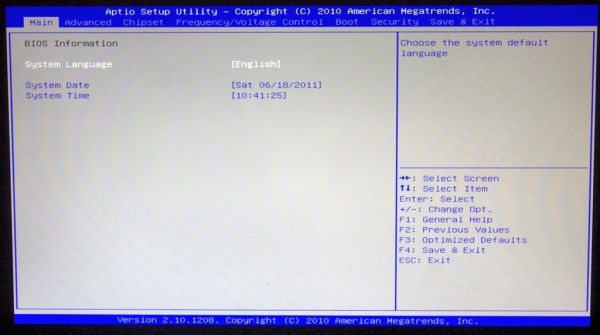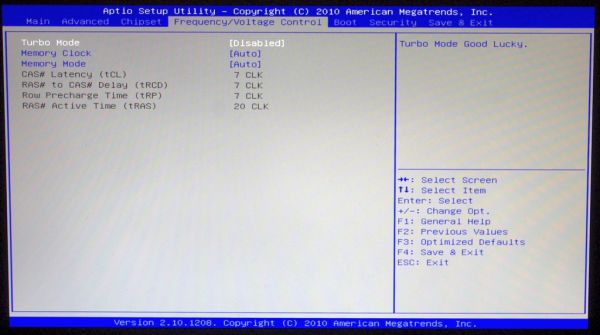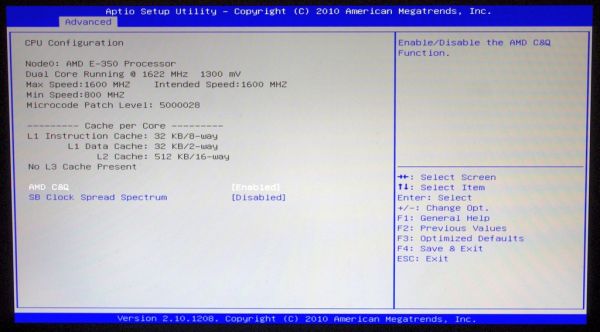Fusion E-350 Review: ASUS E35M1-I Deluxe, ECS HDC-I and Zotac FUSION350-A-E
by Ian Cutress on July 14, 2011 11:00 AM ESTECS BIOS' of past have been rather lacking, in terms of options and design. Sadly, the HDC-I is no exception to this rather flat rule. The take on it seems to be 'it works, so much for the user experience'. Options are, for the most part, spread out across menus rather than being consolidated, and there's no serious information connection. Take the main page - there's no mention of the motherboard type, the CPU model currently in it, the speed of the processor, the amount of memory or the temperature. This information is on other screens, but it's nice to have it on the first screen at least.
By default the SATA ports are set to IDE rather than AHCI, but the money shot of the BIOS is in the 'Frequency/Voltage Control' Menu. The first option here is the 'Turbo Mode', with the help message of 'Turbo Mode Good Lucky'.
What this option does is impressive. Change it to the enabled setting, and the board will apply a 33% overclock to the processor, and automatically adjust the voltage. With this option as standard, they've decided against adding any other overclock options (like the ASUS board) apart from the memory, where DDR3-800 to DDR3-1333 are selectable (which equates to DDR3-1064 to DDR3-1777 when overclocked), as well as the major subtimings. By default, DDR3-800 and 7-7-7-18 were selected when left on auto on our Patriot Viper Xtreme set.
The other positive feature of the BIOS is the boot override - something every BIOS should have by now. If you want a one-time boot from a separate device (CD, DVD, USB) then this is the option to do it. It thankfully accepts NTFS file systems (unlike some ASRock boards) as well.
Overclocking
In terms of overclocking, there's not much to say, apart from the turbo mode available in the BIOS, adding 33% clock speed to 2.13 GHz. The default bus speed flickers between 100 MHz and 102.1 MHz, so at overclock it flickers between 133 MHz and 135.1 MHz, giving a little advantage over other boards. This 33% boost also affects the memory, turning the DDR3-1333 setting into DDR3-1772, which is also a large improvement. There are no overclocking options for the OS though.
The overclock gave a boost of 34.5% boost to our single threaded 3D Movement benchmark, and a 33.0% boost to the multithreaded version. In terms of power, during video, the overclocked version consumed 5W more as a peak value, though this difference was not seen in Metro2033 or OCCT.



















67 Comments
View All Comments
CZroe - Saturday, July 16, 2011 - link
Regarding the Asus board not having HDMI1.4, you never seem to confirm that the others do or don't. have it. Should I assume they do or don't?"...and a Wifi card with a pair of antenna"
Antennae is the plural of "antenna." ;)
You wonder about the VGA reference in the Asus board's BIOS, but other boards clearly include a DVI to VGA adapter. Even if the Asus board doesn't include it, it could be referring to that unless it is DVI-D only. Does it support a VGA adapter?
"how overclocking effects gaming"
"Effects" should be affects.
Akdor 1154 - Saturday, July 16, 2011 - link
Given these boards are clearly pushed at the HTPC usage scenario (HDMI, TOSLINK optical outputs, one of the most powerful onboard GPUs ever made, passive cooling, etc) it is very disappointing to not see any of this functionality tested out.How did they perform decoding video? Given the high CPU usage on network utilization, is there any issue playing high bitrate content from a NAS somewhere else? Can I encode? How did the GPU perform on OpenCL tasks (namely, again, content encoding)? Can the PCI-E slot take a TV tuner? What about Flash, if only for Youtube? How about upscaling low-resolution content?
And for the love of God, given two passive and one active cooling setups, how did they fare in a REAL case? Don't know many people who run their HTPCs in open-air, and the nice small cases available can be quite restrictive in terms of airflow - so will the passively cooled boards even be suitable for these? How about fan noise? It would seem Zotac and ASUS went passive because of noise concerns, so how bad was the ECS's little 40mm fan?
What about WiFi performance? You complained about one only supporting HDMI 1.3b; did the others support 1.4 (and hence 3D) perfectly? Did you test this? There was an issue with Windows' audio buffer latency - it would have been great to see this actually tested out to see if it made any difference, instead of a vague "some people might be able to hear it". Did the problematic board skip at all?
Summing up the lack of insight in the way this review was carried out.. <b>did you even test Blu-Ray playback</b>?
I'd love to see this information added to this review - I'd also be interested to know how many people you think would purchase this intending to run Metro 2033 on it.
And finally it seems your comment form is broken in Opera.
evolucion8 - Sunday, July 17, 2011 - link
And the odd thing is when they were testing its IGP performance with Metro 2033, calling it "the Crysis of DX11 until Crysis 2 arrives, so Crysis 2 haven't been released yet? Mishmash of old and new sentences of old articles glued together. Pretty much the same thing that apoppin does on Allienbabletech and his horrible lack of focus and handbacked marketing propagandism.Plus the fact that the review has a lack of objectivity as it isnt compared to its direct rival the Atom/ION combination. I wonder who will stick a GTX 580, play games or will use it for WinRaR archiving. Atom and Fusion aren't powerhouses, are CPU's for very basic stuff and HTPC and they would had done tests in that arena, like web browsing tests, movie playback, Flash tests, USB and HD performance etc. Totally irrelevant, how low can this go?! Definitively one of the worst reviews I've ever seen.
Overall, a HTPC oriented system tested with unconventional tests against much more expensive and powerful solutions. It is like taking a Ferrari and test its performance under water and in outerspace and comparing it against the Columbia Shuttle and Navy's Nuclear Submarine. Things had gone under spiral lately and integrity has been long gone in here, a pity.
PR3ACH3R - Sunday, July 17, 2011 - link
@ Ian CutressThanks for the review,
I think you touched upon a few important points like thermal performance, but as a whole, this review leaves a lot to be desired.
it is incomplete, & fails to address what the target audience of these products, wants to know.
Did this review help me decide what board to buy for HTPC use?
I'm afraid not.
Ichinisan - Sunday, July 31, 2011 - link
It's pretty clear why the Asus BIOS mentions "VGA." The Asus and Zotac boards have DVI-I connectors, so they have extra pins for analog and work with a VGA adapters.dakky21 - Saturday, November 5, 2011 - link
I registered on this board just to say that... not ALL boards have overclock function !!!!I just bought HDC-I v1.0 yesterday, in fact only because I read it had overclock option, but what a cold shower - it does not have. At least not where it should be, under Frequency/Voltage control in BIOS.
dakky21 - Sunday, November 6, 2011 - link
To clarify, my board has BIOS version 2.10.1208 (03/24/2011) and there is NO Turbo Mode in Frequency/Voltage control. No way of getting around 33% more speed. Unfortunately, I bought this board just because of that. Never again trust reviewers or ECS...